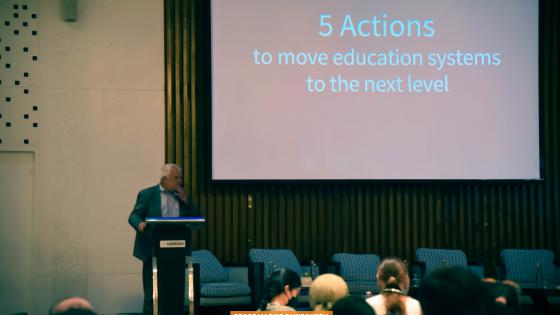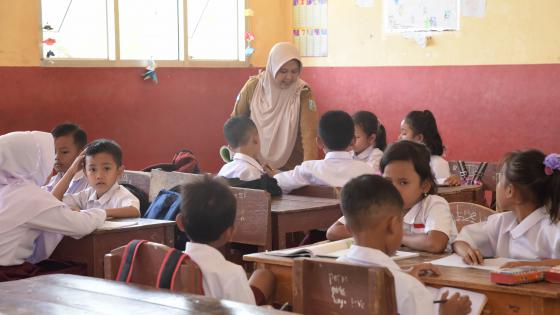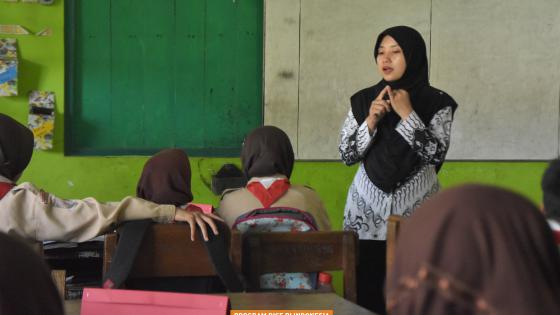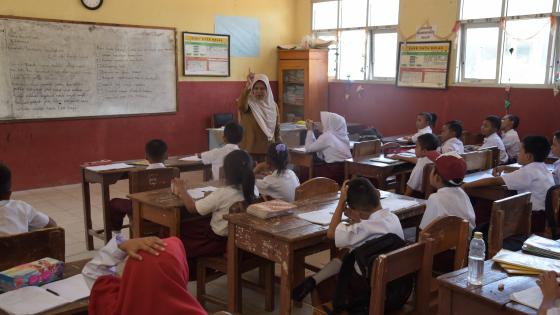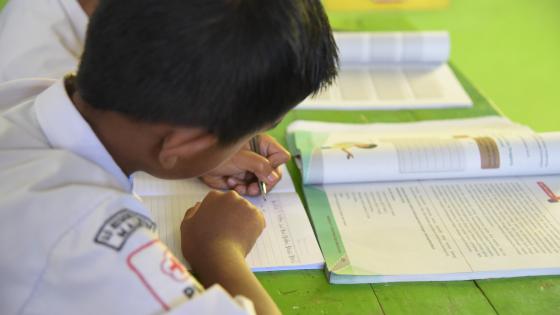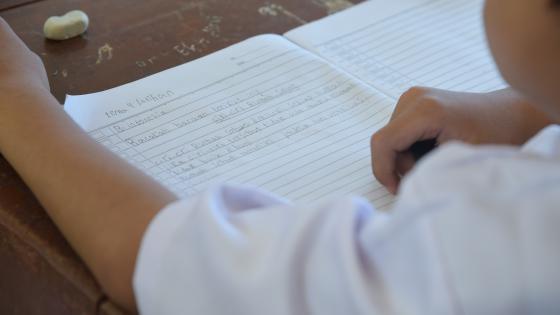All participants of the RISE Programme in Indonesia Update. | Photo: Mukti Mulyana
Since its launch in September 2017, RISE Programme in Indonesia has conducted diagnostic on Indonesian education system, completed the KIAT Guru endline survey, decided on the locations for learning labs, developed research instruments, and released the Indonesian Learning Profile. In carrying out its research activities, RISE actively collaborates with stakeholders and policymakers.
On 3 July 2018, RISE held an event entitled “RISE Programme in Indonesia Update” to inform the progress of RISE’s research to education stakeholders from various government institutions: the Ministry of Education and Culture (MoEC); the Ministry of Research, Technology, and Higher Education (MoRTHE); Ministry of National Development Planning/National Development Planning Agency; the Ministry of Religious Affairs; and Commission X of the People’s Representative Council (DPR). In organizing the event, which took place at the office of the MoEC, RISE collaborated with the MoEC’s research and development unit (Balitbang). In addition to conveying the latest information on RISE’s research, the event also aims to generate constructive discussion as well as feedback related to RISE research design, and to engage stakeholders in the process of education policymaking.
Dr. R. Muktiono Waspodo, M.Pd., Head of the MoEC’s Balitbang presented the opening speech. Continued by Totok Suprayitno, Ph.D., Head of the MoEC’s research and development unit, who spoke about the condition of today’s education in Indonesia: there is still inequality of access to education and that many children are in school but they are not learning. He also emphasized that Balitbang welcomes the collaboration with RISE to address important and urgent problems in education.

Totok Suprayitno, Ph.D. said that the main problem of education in Indonesia today is that children are in school, but they are not necessarily learning. | Photo: Mukti Mulyana
Next was Sudarno Sumarto, Team Leader of RISE, who presented the latest developments in RISE’s research. He first talked about Indonesia who is currently facing the challenges of education 3.0. In this phase, the main challenge of education is no longer on student enrolment (phase 1.0) or the number and welfare of teachers, and education facilities as well as infrastructure (phase 2.0); it is on the quality of learning.
The results of the student competency tests conducted through the INAP (Indonesian National Assessment Programme), TIMSS (Trends in International Mathematics and Science Study), and PISA (Program for International Student Assessment) show that currently Indonesian children are attending school, but they are not necessarily learning. This condition is the background of the implementation of RISE Programme in Indonesia. Sudarno then explained about the studies that RISE will carry out over the next five years and the research methods to be used.

Sudarno Sumarto is talking about RISE. | Photo: Mukti Mulyana
In School, But Not Learning
On the same occasion, Deputy Team Leader RISE, Daniel Suryadarma, presented the Indonesian Learning Profile. The Profile is build using data from the Indonesian Family Life Survey (IFLS) 2000, 2007, and 2014. At the beginning of the presentation, Daniel mentioned that education spending between 2000 and 2015 almost doubled and had a positive influence on school enrolment; net enrolment rates have increased, which is almost 100% for primary schools, from around 70% to around 90% for junior secondary schools, and from approximately 40% to 70% for senior secondary school.
Although net enrolment rates in all education levels has bettered, learning improvement in Indonesia has been too slow. PISA scores show that Indonesia will need almost 100 years to reach the average score of PISA participating countries that are members of the Organization for Economic Co-operation and Development (OECD). In addition, Indonesia's math score in TIMSS actually shows a downward trend, which was 403 in 1999 to 386 in 2011.

Daniel Suryadarma is presenting the results of IFLS. One of the prominent findings from the IFLS results is that the skill to do simple fraction problems (e.g., 1/3-1/6) is very low (under 20%), even in adult respondents. | Photo: Mukti Mulyana
The Indonesian Learning Profile produces the following conclusions.
- Learning profile in Indonesia starts low.
- There is very little improvement of learning in between education levels. Data shows that approximately 14% of respondents who are secondary school graduates have lower numeracy skills than Grade 1 primary school students.
- Between 2000 and 2014, basic skills of students at all levels of education (Grade 1 primary school to Grade 12 secondary senior schools) had declined.
Improving Teachers Quality
In addition to discussing Indonesian education and its learning profile, the speakers and participants also discussed the issue of improving teacher quality. The presentation on the said subject was delivered by Dra. Santi Ambarukmi, M.Ed. (Head of Sub-Directorate for Improving Qualifications and Competencies of Secondary Education and Special Education Educators), Drs. Anas M. Adam, M.Pd. (Director of the MoEC’s Basic Education Teacher Development), and Edi Mulyono, S.E., M.M. (Representative of MoRTHE’s Director of Learning). Both presenters and speakers, Waspodo and Suyanto, Ph.D. (Professor of Yogyakarta State University), said that the quality of education in Indonesia depends heavily on the quality of teachers. Therefore, strategies to improve the quality of education also need to focus on improving the quality of teachers.
There are two factors mentioned by the speakers that are important to improve the quality of teachers.
- Ensuring the process of education, recruitment, and placement of teachers has significant impacts on improving the quality of teachers.
- Ensuring the continuing professional development is held effectively to improve the quality of in-service teachers.

Dra. Santi Ambarukmi, M.Ed. is talking about the efforts to improve professionalism of secondary education teachers and in-service special education teachers. | Photo: Mukti Mulyan

Drs. Anas M. Adam, M.Pd. is talking about the efforts to improve professionalism of in-service primary education teachers. | Photo: Mukti Mulyana

Edi Mulyono, S.E., M.M. is talking about how to prepare qualified teachers through pre-service PPG. | Photo: Mukti Mulyana
The presentation and discussion was followed by Q&A session. Director of SMERU, who is also Chairman of RISE’s Steering Committee, Dr. Asep Suryahadi, concluded the discussion and then ended the event. Going forward, the MoEC’s Balitbang and RISE will continue to work together to find strategies and policies that can improve learning outcomes.
.
.
.
Video and presentation files can be accessed here.
Photos from the event can be accessed here.


